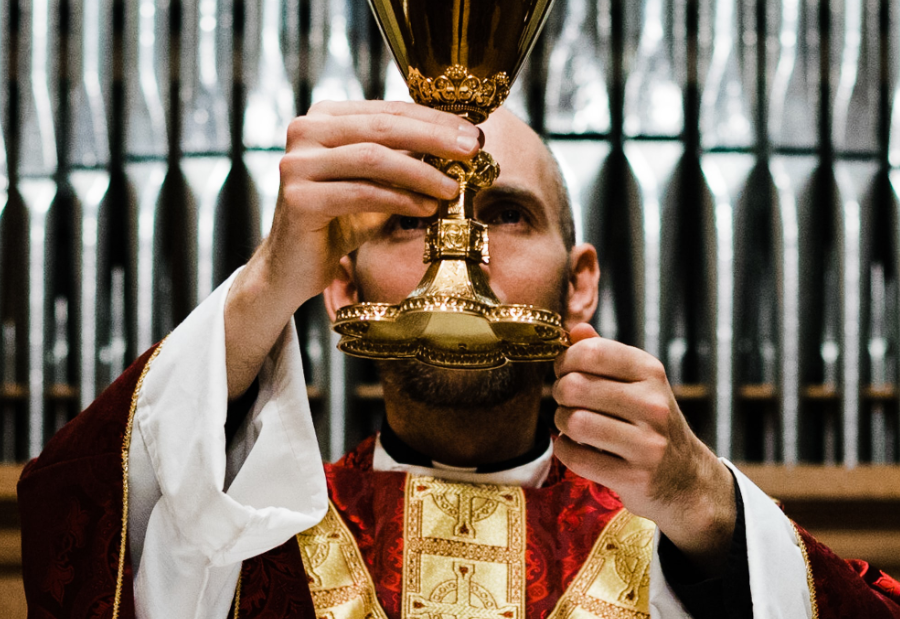“For the mind of man is far from the nature of a clear and equal glass, wherein the beams of things should reflect according to their true incidence; nay, it is rather like an enchanted glass, full of superstition and imposture, if it be not delivered and reduced.” (Sir Francis Bacon, 1640)
In the murky depths of the human mind, faith and reason both participate in forming beliefs. But they don’t necessarily overlap or share the same epistemic value in forming knowledge.
I’m inspired by Nick Trakakis’ thoughtful account of his struggle to reconcile his faith with philosophic inquiry in ‘Why I am not Orthodox’ on ABC’s Religion & Ethics, 7 December 2015. Trakakis concludes that faith commitment to the main forms of organised religion is “incompatible with the pursuit of truth and wisdom”.
The idea that faith contains epistemic value is the mirage of organised religion. I want to challenge the understanding of faith presented in the responses to Trakakis article – ‘Faith Gives Fullness to Reasoning: A Response to Nick Trakakis’, by Benjamin Myers, 9 December 2015, and ‘Intellectual Assent and the Value of Disagreement: A Response to Nick Trakakis’, by Richard Colledge, 22 December 2015, both from ABC’s Religion & Ethics.
Blaise Pascal paradoxically described faith as providing the ‘heart’ with ‘reasons’ which elude ‘reason’: “The heart has its reasons, which reason does not know. We feel it in a thousand things. It is the heart which experiences God, and not the reason. This, then, is faith: God felt by the heart, not by the reason.”
By definition, faith and reason are mutually exclusive. Faith is defined various ways, but always entails a lack of evidence. Faith always walks hand in hand with doubt. The Stanford Encyclopedia of Philosophy defines faith generally as ‘trust’, and notes religious faith has several models: ‘affective’, ‘cognitive’ or ‘volitional’.
Affective faith is a state of confidence and trust. Cognitive faith, as argued by John Calvin and Alvin Plantinga, refers to certain knowledge of God provided directly through revelation. Cognitive faith arms itself with reformed epistemology, an alternative epistemology where claiming direct knowledge of God is a legitimate form of evidence. The cognitive faith of reformed epistemology is excluded from this discussion because it attempts to fundamentally alter the generally accepted rules of evidence and verification. It even endows humans with a cognitive faculty for detecting God, the sensus divinitatis, of which no evidence exists. Unless there’s some reason or evidence to regard reformed epistemology as a legitimate arm of knowledge, then it remains an article of faith itself.
Volitional faith is the choice to believe sometimes characterised as intellectual assent. Faith can be either a type of act or a type of assent. So both affective faith and volitional faith involve trust and confidence in a proposition.
Philosopher Matt McCormick defines faith as “belief without sufficient evidential justification”. Faith is offered in defence of believing in what we have insufficient legitimate reasons to believe. Faith should not be used as a substitute for evidence. To use it as justification for belief is a category mistake which assumes the existence of a faith-based category of knowledge which is unavailable.
By definition, faith and reason are mutually exclusive. Faith is defined various ways, but always entails a lack of evidence. Faith always walks hand in hand with doubt.
The Oxford Dictionary defines evidence as “the available body of facts or information indicating whether a belief or proposition is true or valid”. If faith could actually contribute something tangible towards accepting a belief, it would constitute evidence. Since faith, by definition, is belief in the absence of sufficient evidence, the concept that it’s an actual reason for belief is self-negating and self-referential. It is breaking the rules of epistemology to insert faith on the evidential scale as if it somehow bridges the gap between incomplete evidence and knowledge.
Faith is an attitude towards evidence, rather than a form of evidence in itself. Faith does not provide “fullness to reasoning”; it simply pumps up the tyres of belief beyond what is epistemically justifiable. Faith has no epistemic content to apply to the proposition.
Failure to understand this leaves us imprisoned in an epistemology where the unknown and the unverifiable share the same status as verified knowledge. We lament the results of this failure over and over in debates about evolution, climate science and other areas where pre-existing beliefs and mythology clash with science.
Once we liberate knowledge from its foggy prison we can consider the merit of applying the same discipline to religion. What happens to religion without the supernatural? Can we reconsider religion without its myths? Is there a non-theistic future for religion?
The ‘faith’ of the gaps
The ‘God of the gaps’ argument uses gaps in scientific knowledge as evidence for God’s existence. A parallel can be drawn in the use of faith to plug the gaps in theories of knowledge. To Benjamin Myers, faith and reason are indelibly connected. Further, Myers claims faith is foundational to reason. But his claim that we “cannot get started without faith” is flawed. The reality is that we cannot get started without evidence.
Myers offers Clement of Alexandria’s argument that we should accept Christianity on faith alone. (I note Clement’s self-defeating claim to have dozens of cogent arguments in reserve). But we simply cannot consider Christianity without processing a substantial sum of information describing the beliefs and doctrines of the religion. These make certain claims about the creation of the world, the life of Jesus, human nature, and our purpose in the world. One cannot fail to consider how credible these claims are. One cannot switch off inbuilt mechanisms for applying our critical faculties to the story, and contrasting it to knowledge of history, cosmology, anthropology and so on.
It’s true that we might choose to adopt belief in the absence of sufficient evidence. But that’s not the same as starting with faith alone. The proposition contains basic information which constitutes evidence. So we’re not starting with faith, but evidence. It’s more accurate to say that we’d be starting with insufficient evidence and heaping faith on top of it, like coals onto a fire.
To start with faith, Myers argues we need to adopt a change of disposition to one of “basic trust”. Myers offers Clement of Alexandria’s comparison of faith to getting drunk at a party. “You might have some doubt about whether it’s right for a person to get drunk. But it’s your practice to get drunk before considering the question… Only when divine things are in question do you first inquire…”
Perhaps it’s a sign of progress that most people don’t just get drunk without thinking about it anymore. Drink-driving laws have put paid to that. And even prior to modern sensibilities about alcohol consumption, it’s quite silly and untrue to say we only apply reason to questions of the divine. But the insistence on applying a ‘disposition’ of trust helps us acknowledge that this is what ‘faith’ is – an attitude, a belief, not a form of evidence.
Nonetheless, it’s worth exploring the problem of knowledge Myers outlines. The assertion that there are things which first must be accepted without proof is based on the philosophical problem of defining knowledge. But, alas, it does not provide a compelling argument in favour of faith. Myers’ point is valid only to the extent that philosophical theories of knowledge are inadequate. Theories of knowledge fail to provide an agreed evidential foundation for what we regard as knowledge.
If I take my knowledge of a thing A, based on the evidence for it B, I should also logically require evidence for B. But now I am stuck in an infinite regress unless I can prove some item of knowledge which is foundational. A foundational type of knowledge might be considered our first direct perception, or an article of faith. Thus, so the argument goes, we must start by assuming something is true.
But, equally, we acknowledge the substantial progress made in science, technology and other areas of knowledge without an apparent foundation. Our expectation that knowledge must have a foundation may be unrealistic, especially considering the traditional definition of knowledge, as justified, true, belief.
Gettier problems (a philosophical question about whether a piece of information that happens to be true but that someone believes for invalid reasons, such as a faulty premise, counts as knowledge) demonstrate the expectation of perfect knowledge is unrealistic given they rely on our own imperfect perception. Things that seemed justified and true have long turned out to be false on closer inquiry. Virtually nothing is known with absolute certainty.
When, for instance, we view a red car, our perception and knowledge is often incomplete. We recognise the image and the attributes of a motor vehicle, but we do not appreciate the object in its totality. We do not know what brand of oil is used. We might not know all of the parts of the car. Many things inside are hidden from view. We would not perceive all of the molecules and atoms which make it up. In addition, we may be deceived by an illusion, or by mental illness, or a failure of eyesight.
But, in practical terms, we can use the red car to go to and from work, to pick up our kids from school, and to go shopping. It is not an article of faith that our red car will reliably assist our lives – it is based on reasonable evidence. Yet our knowledge of it is far from perfect. Yet, even so, there’s no reason whatsoever to place “faith” as the foundation of our red-car knowledge. And though we are satisfied by our practical knowledge, we cannot justify how our knowledge of the red car is founded.
The ‘faith’ of the gaps is the unjustified insertion of faith as the foundation of knowledge. This theory not only suffers from a lack of any substantive argument, it must overcome the seemingly insurmountable obstacle that faith is not an article of evidence but an attitude towards it.
Crucially, the limits of knowledge do not dictate that we must take things on faith. The nominated candidates for faith are almost always an extremely narrow set of metaphysical, religious beliefs for which no verifiable proof or disproof exists. It is hardly coincidental that the advocates for elevating faith are the same people who advocate the unverifiable beliefs.
Myers quotes Augustine from The Advantage of Being: “If it’s wrong to believe something we do not know, I’d like to know how children can obey their parents and return their love and respect without believing they are their parents. There’s no way this could be known by reason. We have a belief about our father based on the word of our mother …”
It is not the case that children rely on faith to determine who their parents are. Children have many good reasons to conclude that their parents are their real parents. Their mother has cared for them ever since they can remember. Their parents might share physical similarities. Their parents claim to be their parents. And their siblings, uncles, aunts, and grandparents all agree. The foundation is not trust, but reasonable evidence. They could even get a paternity test if necessary!
Augustine continues: “But we do believe, without any hesitation, things that we admit we can’t really know… We could give lots of examples to show that nothing in human society would be stable if we decided not to believe anything except the things that can be held with absolute certainty.”
From the premise that we believe many things which cannot be known with ‘absolute certainty’, it does not follow that we must therefore rely on faith. As Sigmund Freud said in The Future of an Illusion: “The weakness of my position does not imply a strengthening of yours.”
The human cognitive bias towards absolutism tricks the mind into imagining the problem as a false dichotomy: faith or reason. But that is a false choice. We base our beliefs and knowledge on a varying scale of reason – a scale varying between no evidence, some evidence and an irrefutable amount of evidence.
Do we, for instance, know anything with absolute certainty based solely on faith? And, tellingly, how would we test any claim that we do? By using evidence? How do we choose which beliefs to have faith in without evidence? Why not choose Poseidon, Mithras, Apollo or any other God to place our faith in?
Faith is not a category of evidence
In William James’ famous lecture given in 1896, ‘The Will to Believe’, he argues in “defence of our right to adopt a believing attitude in religious matters, despite our merely logical intellect may not have been coerced”. James is influenced by the human need for necessary knowledge: “ … the risk of being in error is a very small matter when compared with the blessing of real knowledge.” He argues absolutism is a requirement of knowledge because humans need it. But simply because humans want or need it, does not make it so.
The underlying a priori assumption that, because humans need certain things, the world and its objective reality must necessarily comply is clearly a product of religious belief itself. One only assumes such a thing if we consider humans pivotal to creation itself.
His most persuasive point is that evidence regarding a belief’s truth or falsity is sometimes only accessible to believers. Pointing to St Augustine’s oft-quoted “unless you believe, you will not understand”, James contends that we must first use faith to welcome in the object of our faith, and only then can we achieve further knowledge.
‘If this is true, then it stands to reason that it applies beyond religious belief. But the testing of a hypothesis or holding a provisional belief in one isn’t the same as intellectual assent. Do the scientists investigating ‘string theory’ actually believe in it? From reading about them recently, it seems they do make an investment in belief to some extent. To be precise, they hold a provisional belief: provisional means subject to testing and verification, sitting somewhat short of accepted knowledge.
Scientific history is full of surprising discoveries made whilst trying to prove something else. By no means is it demonstrated that any particular knowledge relies on holding a belief in it prior to discovery or verification. And wondering if something is true is hardly the same as believing it.
And how can we ignore the internal contradiction of arguments made for faith on the basis of evidence and reason? We’re asked to accept an attitude of ‘basic trust’ to propositions such as the existence of God or Christianity, without sufficient reason and evidence, by accepting the offered reason and evidence. On what epistemic basis do we consider such arguments? If they are lacking in evidence, do we just insert an attitude of faith? And, if so, how can we ignore the obvious circularity in using faith to justify faith, and the internal contradiction of using evidence to justify faith?
Continue reading to Part 2 here.
This article is being republished in two parts as part of our ‘The season for reason’ series of holiday reading focusing on rationalism and reason. The article was originally published as a whole as ‘Defogging the Enchanted Glass: A fundamental examination of the intersection of reason and belief’ in the Winter 2016 edition of Australian Rationalist. Minor changes have been made in the republished article.












